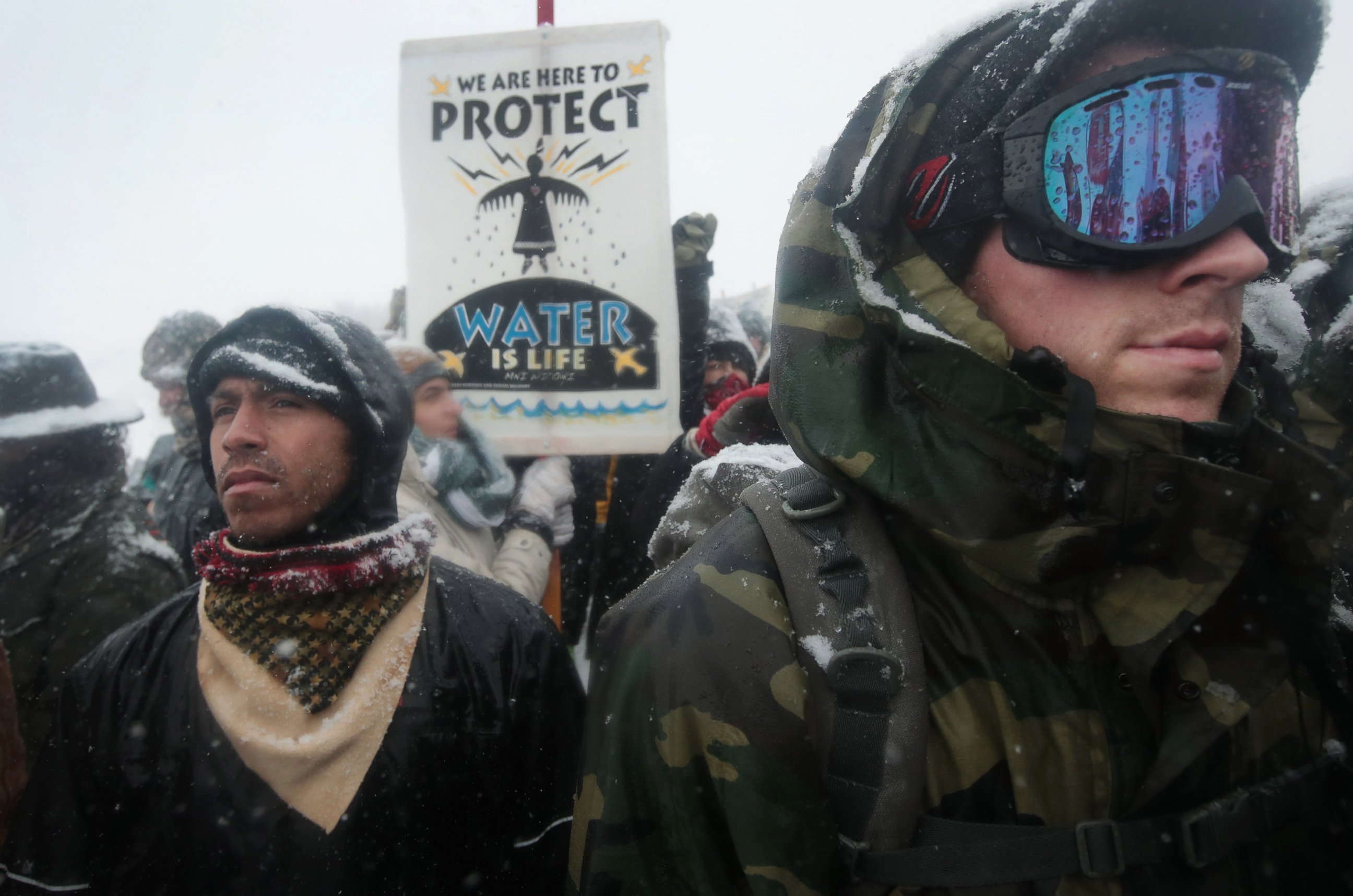How Donald Trump Could Overturn the Dakota Access Pipeline Decision if He Wanted To
Army Corps has denied the easement needed to finish the controversial pipeline.
— -- Environmental activists and protesters have rejoiced the temporary halting of the controversial Dakota Access Pipeline, but according to some experts with whom ABC News spoke, there are several avenues for President-elect Donald Trump to overturn the decision and continue the construction of the pipeline once he assumes office in January.
William Buzbee, a professor at Georgetown University Law School who specializes in environmental and administrative law, said that there are multiple ways that a President Trump could prompt the construction to continue, with varying speed.
“He has two main choices: one would be to act through the Army Corps of Engineers and the other to try and act with the assistance of Congress,” Buzbee said.
Trump could let the Army Corps of Engineers perform the Environmental Impact Statement that it said this weekend it wants to complete, and see what alternatives are presented there, though that could take several months. Buzbee said that route would likely be Trump’s “safest” way to proceed.
The U.S. Army Corps of Engineers announced on Sunday that it will not approve an easement needed to permit the Dakota Access Pipeline to cross under Lake Oahe in North Dakota. Protesters say that the pipeline traverses culturally sacred land to the Standing Rock Sioux Tribe and endangers the water supply. Energy Transfer Partners, the company behind the pipeline, has previously said those claims are unfounded.
Buzbee also suggested that Trump could work with Congress to “carve out a protection” for this specific pipeline. Other presidents have made similar moves on behalf of certain endangered species, Buzbee said, and since Trump will be working with Republican majorities in both the House and Senate, that could help as well.
A third route that Buzbee suggested was that Trump could ask the Army Corps to re-examine its decision, “hoping that they will re-examine it and reverse themselves with nothing more.” But that would likely lead to lawsuits against either the Army Corps or the Trump administration, Buzbee noted.

“It really depends on what the president is trying to achieve. If the president wants to pick a fight -- which might be the political choice -- then he might prefer to do something that’s quick and leads to a lawsuit because that would create a lot of publicity,” Buzbee told ABC News.
Trump spokesman Jason Miller said this morning that the pipeline “is something that we support construction of,” and said that the administration will review the Army Corps' decision at the appropriate time.
Trump's financial disclosure forms show that in May he owned between $15,000 and $50,000 in stock in Energy Transfer Partners. That amount is down from the year prior, when records show that Trump had between $500,000 and $1 million invested in the company.
Trump transition team talking points obtained by ABC News on Friday state that “his support for this project has nothing to do with his personal investments and everything to do with promoting policies that benefit all Americans.”

The AP reported Friday that Trump’s spokeswoman Hope Hicks said it was her understanding that the president-elect had sold all of his stock in the company but did not confirm any further details.
Energy Transfer Partners filed for a court order two weeks ago asking for the right-of-way to complete construction of the pipeline without further intervention from the federal government. The court has yet to rule on the matter. It is unclear how the Army Corps' decision this weekend will affect this lawsuit.
In a court filing late this afternoon, the pipeline company blasted the Army’s decision to deny permission for the pipeline to cross the Missouri River on federal lands, asserting that the ruling is “part of a transparent capitulation to political pressure,” bowing to “an escalating campaign of violence and disorder waged by protestors who seek to impede the construction of the pipeline.”
Army communications director Moira Kelley told ABC News today that “the new Administration will have to decide how they want to proceed under relevant laws and standards of conduct.”
Brigham McCown, who worked for the U.S. Department of Transportation and focused on pipeline safety during President George W. Bush’s administration, said that the Army Corps’ latest decision “will not likely stick” during the Trump years.
“From all indications, this decision was made at the political level. ... The next administration could just overturn that and approve that,” said McCown, who is now the chairman of infrastructure think tank The Alliance for Innovation and Infrastructure.
“This was a political decision by the Obama administration to rescind the permit and then come out with a denial so it would be easy to make a second political decision to reverse it," McCown said.
However, not everyone is convinced.
Jan Hasselman, an attorney with the nonprofit group Earth Justice who is representing the Standing Rock Sioux Tribe, stressed that for Trump’s administration to overturn the latest decision, “it’s not as simple as a stroke of the pen.”
“It’s going to be subject to the same legal standards that any government decisions are, and will be subject to close judicial rule by a court,” Hasselman said.
Timing could work on the side of the activists, as Trump will be unable to take any action until after he is sworn in on Jan. 20.
Michael Brune, the executive director of the Sierra Club, said that "legally, procedurally and politically it will be much more difficult for the incoming Trump administration to try to reverse course."
"By the time that happens, that will be seven weeks down the road, an Environmental Impact Statement will have already begun. And to reverse that would be, aside from the politics and the morals and ethics of that, would be a challenge to do legally," Brune said
"We, and others, would fight to uphold the National Environmental Policy Act to make sure that the Trump administration is accountable to the law. So, it might be possible for the next administration to try to reverse course. It will be difficult to do procedurally," he said.